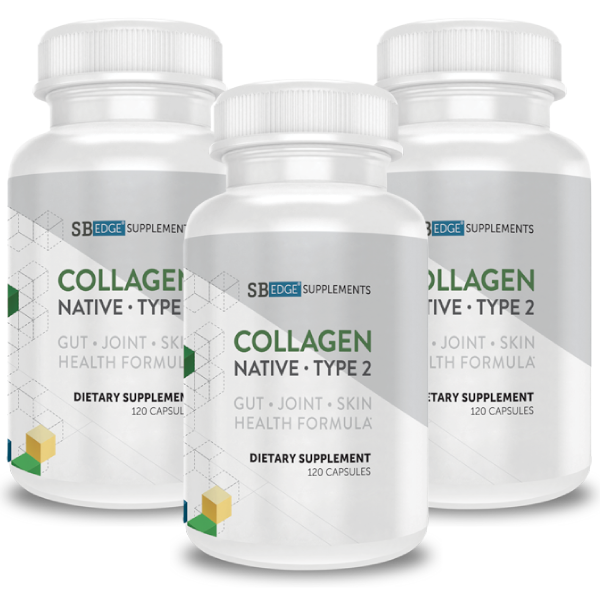Joint & Pain Health
How Collagen Helps Joint Health
Collagen plays an important role in joint health.
How Collagen Supplements Help with Joint Health & Joint Pain
Collagen Native Type 2 (CNT2) is an excellent source of undenatured type 2 collagen. Supplementing with it is an easy and effective way to potentially help improve joint pain while promoting overall joint health. Unlike a collagen peptide, CNT2 is a full collagen molecule in its natural form which allows your body to process it and give you the complete effect of a collagen supplement.
Joint damage from aging causes our cartilage to break down faster than our bodies can regenerate it. Certain studies suggest that supplementing with certain collagens may promote the body’s ability to regenerate cartilage and repair joints, resulting in less joint pain and lessening inflammation. Patients in these studies with mild to moderate osteoarthritis experienced statistically significant improvements in knee function and decreases in pain following treatment with collagen supplementation. Feel free to navigate to our articles page to review some of the collagen and joint health research we have linked to.

How Do Joints Change With Age?
As we age our bodies undergo changes in our joints. Cartilage is a connective tissue that allows our joints to move more freely and it is largely made up of an abundant structural protein called collagen. Our bodies own ability to naturally produce collagen lessens as we age. As a result, our cartilage breaks down faster than our bodies can regenerate it.
The activities that we used to perform on a daily basis, or those repetitive activities we do over and over again, without any discomfort, start to lead to aches and pains in the joints. These natural changes in our body lead to increased joint pain and stiffness making it more difficult to participate in sports or even regular daily activities.
What Are Some Other Factors That Impact Joint Health?
In addition to the effects of aging, our joint health can also be impacted by specific diseases in the joints. The two most common diseases are osteoarthritis and rheumatoid arthritis.
Osteoarthritis involves the typical age-related joint pain and stiffness. It is signaled by the gradual wear and deterioration of the cartilage found in the joints. It can also include grating or cracking sensations felt in the joints, swelling, and bony growths or bone spurs. Osteoarthritis is one of the most common joint diseases and typically affects the joints in your hands, knees, hips and spine.
In rheumatoid arthritis, an autoimmune condition, the body is unable to distinguish between “self” and “non-self.” This results in the body attacking its own joint cartilage. These attacks on the cartilage lead to inflammation, stiffness, pain, joint damage and deterioration. While more research is needed to study the effects on rheumatoid arthritis by supplementing with a collagen supplement, we encourage you to check out some of the links to scientific studies that have been done on our articles page.
Supplementing with Collagen, especially a type 2 collagen which is primarily found in the joints, will supply your body with a quality source of collagen that may help the body repair and rebuild damaged joints.
Your Joints Need Collagen For Healthy Cartilage
Collagen is a structural protein of cartilage, and type 2 collagen “is” the collagen that provides the structural strength and support to the cartilage found in the joints. The use of a supplemental collagen might help significantly improve the rebuilding of tissues that are damaged and causing you joint pain by resupplying your body with the collagen it needs.
Supplementing with a type 2 collagen especially, potentially offers a larger benefit to you when you are considering a collagen supplement for your joint health, as compared to a type 1 or a type 3 supplement, because type 2 collagen is the type of collagen found in your joints.
Build Muscle Mass
The muscles in your body also benefit from the use of collagen. Not only do the muscles connect to the bones through collagen rich tendons, but the muscles themselves are interwoven with collagen to reinforce and support the muscle itself. This intramuscular connective tissue provides mechanical support and helps in the force transmission of the muscle to the body.
Work, training and daily life put a strain on this tissue and supplementing with a high-quality collagen may help to resupply the body with the collagen it needs to rebuild these collagen networks. Additional evidence shows that supplementing with this protein following resistance exercise training may help further enhance muscle mass and even strength.
Bundle and Save Today!
For your convenience you can order your collagen supplements online, direct from us, the manufacturer, with no middleman involved.

